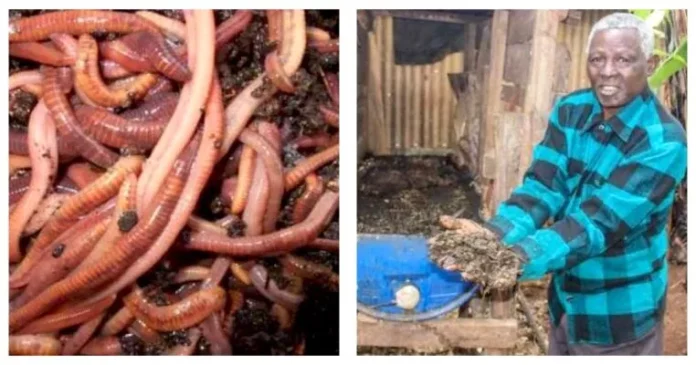Daniel Mwiti, a retired teacher and a farmer from Kaguma, Meru County, is among the few farmers in the country practicing the less explored yet profitable earthworm farming.
The farmer who rears red earthworms is a beneficiary of a 2018 Meru County Initiative that provided farmers with resources for projects involving earthworms and black soldier flies.
His venture has not only become his source of income but has also attracted wide admiration, with people trooping to his farm to learn about earthworm rearing.
Mwiti, who practices mixed farming, says that during the initial phase of the project, he received various materials, including a 200-litre plastic tank, which he divided into two equal parts and positioned horizontally on a one-metre elevated structure.
On the base, he spread about 10 kilos of concrete and placed a sisal sack on top then spread river sand on the sack.
Kiptoo Tarus: Kenyan man who quit banking job to study, create art in US
To provide a conducive environment for the worm, Mwiti collected waste silage from his cow shed, placed it on the sand and poured 30 litres of water into each tank.
He sourced the earthworms from the Jomo Kenyatta University of Agriculture and Technology (JKUAT) for Sh2,500 per Kilo.
He explains that he rears the worms for the production of vermiliquid, a process that takes four months. The vermiliquid is used as foliar fertilizer.
”I add more water and food for the worms every two weeks. The sand and concrete filter the water, and after four months, I am ready to harvest the liquid, which is foliar fertilizer,’’ he explains.
The farmer says after four months, he harvests the organic manure and a liquid rich in protein.
He harvests about 80 litres of the liquid and sells it to farmers at Sh300 a litre. He also sells seed worms at Sh2,500 a kilo.
”Since the concentrate is rich in protein, I experimented by adding it to the water that my cow drinks. The results were amazing. Within two weeks, the daily milk yield increased from five litres to five litres,’’ he says.









